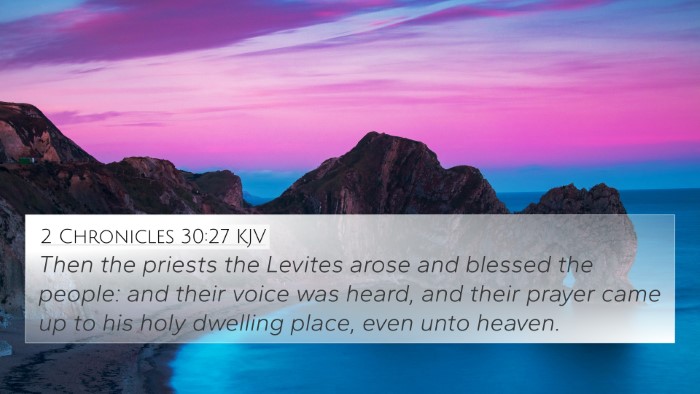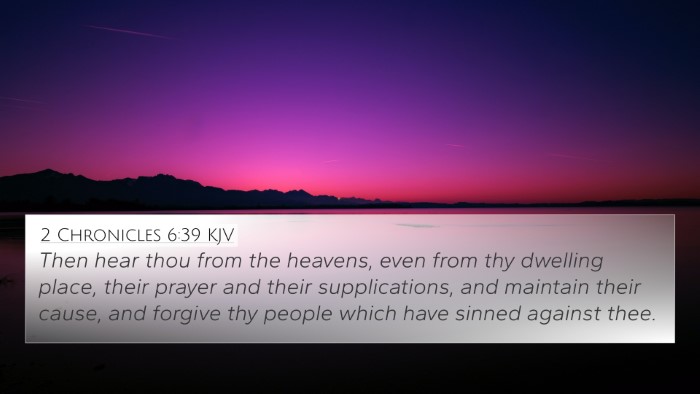Understanding 2 Chronicles 6:21
Verse: 2 Chronicles 6:21 - "Hearken therefore unto the supplications of thy servant, and of thy people Israel, which they shall make toward this place: hear thou from thy dwelling place, even from heaven; and when thou hearest, forgive."
Summary of Meaning
The verse captures King Solomon's appeal to God during the dedication of the temple, emphasizing the significance of prayer and divine responsiveness. Solomon requests that God hears the prayers of the Israelites directed towards the temple, acknowledging the physical place of worship as a means of connecting with God.
- Prayer and Divine Listening: The verse highlights the belief that God listens to the prayers of His people. It underlines the importance of supplication in the life of believers.
- Divine Forgiveness: A key element of the prayer is the request for forgiveness, indicating the recognition of human fallibility and the need for divine grace.
- The Role of the Temple: Solomon points to the temple as a focal point for worship and prayer, establishing it as a sacred space where people can connect with God.
Commentary Insights
Leveraging insights from established commentaries enhances our understanding of this verse:
- Matthew Henry: Emphasizes the significance of approaching God in prayer and the heart's posture in supplication. He notes that God's listening is contingent upon the sincerity of the requests made by His people.
- Albert Barnes: Highlights the assurance of God's attention to the prayers directed to Him. He details the concept of collective prayer, where the Israelites unite in their pleas for divine intervention.
- Adam Clarke: Focuses on the implications of the temple as more than a physical structure; it represents a spiritual connection between God and His people. Clarke also discusses the theological implications of seeking forgiveness through prayer.
Bible Cross References
2 Chronicles 6:21 is related to various themes found throughout scriptures. Here are some pertinent cross-references:
- 1 Kings 8:30: Solomon's similar prayer reflecting on God hearing the cries from the temple.
- Psalm 130:4: "But there is forgiveness with thee, that thou mayest be feared." This passage echoes the theme of divine forgiveness.
- Matthew 6:6: Jesus teaches about private prayer, emphasizing that God sees the heart’s intent.
- 2 Chronicles 7:14: A divine promise that if God's people humble themselves and pray, He will hear from heaven and heal their land.
- James 5:16: "The effectual fervent prayer of a righteous man availeth much," affirming the power of prayer in reconciliation with God.
- Isaiah 55:6-7: Encourages seeking the Lord while He may be found, highlighting the nature of God’s readiness to forgive.
- 1 John 1:9: "If we confess our sins, he is faithful and just to forgive us our sins." This underscores the relationship between confession and forgiveness.
- Romans 10:12-13: Proclaims that everyone who calls on the name of the Lord will be saved, enhancing the idea of God's accessibility in prayer.
- Hebrews 4:16: Encourages believers to approach the throne of grace boldly to receive mercy, which reflects the heart of Solomon’s plea.
- Luke 18:13: The humble prayer of the tax collector, illustrating the humility necessary in approaching God.
Thematic Connections
This verse serves as a bridge to understanding broader biblical themes:
- Inter-Biblical Dialogue: 2 Chronicles 6:21 connects with prayers of the Old Testament and New Testament teachings about the importance and power of prayer.
- Comparative Bible Analysis: Comparing Solomon's prayer with Jesus' teachings on prayer shows a continuity of themes related to supplication and divine interaction.
- Thematic Bible Connections: This verse links themes of mercy, prayer, and the relationship between God and humanity seen throughout biblical texts.
Utilizing Cross-References in Study
Understanding the connections between Bible verses enriches one’s study of scripture. Here are some tools and methods for effective cross-referencing:
- Bible Concordance: An invaluable tool for locating and studying cross-referenced verses.
- Cross-Reference Bible Study: Implementing a systematic approach to explore relationships among verses enhances comprehension.
- Bible Reference Resources: Utilize commentaries and study Bibles that provide cross-references for deeper insights.
- Engaging in Thematic Studies: Identifying themes such as prayer or forgiveness across multiple scriptures fosters a holistic understanding of biblical teachings.
- Detailed Analysis of Context: When studying cross-references, always consider the context of each verse for accurate interpretation.
Conclusion
2 Chronicles 6:21 is a profound reminder of the power of prayer and the assurance of God's willingness to forgive. The communal aspect of prayer highlighted in this verse resonates throughout both the Old and New Testaments, encouraging believers to engage in heartfelt supplication directed towards God. Through systematic cross-referencing and thematic exploration, one gains a fuller understanding of the rich tapestry of God's word, enhancing their spiritual journey.
















